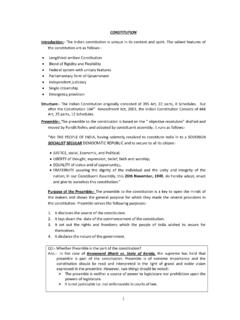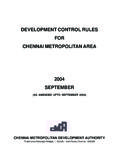Transcription of THE TAMIL NADU LABOUR WELFARE FUND ACT, 1972 (Act …
1 1 THE TAMIL nadu LABOUR WELFARE FUND ACT, 1972 1(Act of 1972) ARRANGEMENT OF SECTIONS SECTIONS: 1. Short title, extent and commencement. 2. Definitions. 3. LABOUR WELFARE Fund. 4. Establishment of Board 5. Constitution of the Board. 6. Appointment of the Chairman and the members to be notified. 7. Term of office of the members. 8. Disqualifications and removal. 9. Resignation of office by member and filling up of casual vacancies. 10. Power to appoint committees. 11. Acts of the Board or committee not to be invalidated by informality, vacancy, etc. 12. Functions of the Board. 13. Unpaid accumulations and claims thereto. 14. Interest on unpaid accumulations or fines after notice of demand.
2 15. Contribution to the Fund by employee and employer. 16. Grants and advances by the Government. 17. Vesting and application of Fund. 18. Power of Board to borrow. 19. Deposit of Fund and placing of accounts and audit report before the State Legislature. 20. Power of Government to give directions to the Board. 21. Appointment and powers of Secretary. 22. Inspectors. 23. Allotment of certain Officers and staff to the Board. 24. Transfer of Provident Fund to the Board. 25. Government to credit the leave salary and pensionary contributions in respect of the officers and servants allotted to Board s service. 26. Appointment of clerical and other staff by Board. 27. Power of Government to call for records.
3 28. Mode of recovery of sums payable to Board. 29. Penalty for obstructing inspection or for failure to produce documents, etc. 30. Cognizance of offences. 31. Offences by companies. 32. Limitation of prosecution. 33. Power to supervise the WELFARE activities of an establishment. 34. Penalty for non-compliance with the direction of the Board. 1 Vide Pt. IV Sec. 4, of the TAMIL nadu Government Gazette, Extraordinary, dated the 6th December, 1972, at 2 35. Annual report. 36. Supersession of the Board. 37. Delegation of powers. 38. Members of Board, Secretary, Inspectors and all officers and servants of Board to be public servants. 39. Protection of action taken in good faith.
4 40. Exemption. 41. Power to make rules. 42. Power to make regulations. 43. Amendment of section 8, Central Act IV of 1936. THE TAMIL nadu LABOUR WELFARE FUND ACT, 1972 (ACT No. 36 OF 1972) An Act to provide for the constitution of a fund for promoting the WELFARE of LABOUR and for certain other matters connected therewith in the State of TAMIL nadu . BE it enacted by the Legislature of the State of TAMIL nadu in the Twenty-third Year of the Republic of India as follows:- 1. Short title, extent and commencement. (1) This Act may be called the TAMIL nadu LABOUR WELFARE Fund Act, 1972. (2) It extends to the whole of the state of TAMIL nadu . (3) It shall come into force on such date *as the Government may, by notification, appoint.
5 2. Definitions. In this, Act, unless the context otherwise requires. (a) Board means the TAMIL nadu LABOUR WELFARE Board established under section 4; (b) employee means (i) any person who is employed for hire or reward to do any work, skilled or unskilled, manual, supervisory, clerical or technical in an establishment for a period of 30 days during the period of 1[the preceding twelve months] whether the terms of employment be express or implied, but does not include any person (a) who is employed mainly in a managerial capacity ; or (b) who being employed in a supervisory capacity 2[draws wages exceeding fifteen thousand rupees per men-sem] or exercises either by the nature of the duties attached to the office or by reason of the powers vested in him, functions mainly of a managerial nature; or (c) who is employed as an apprentice or on part-time basis.
6 Explanation An apprentice means a person who according to the Certified Standing Orders applicable to the establishment, is an apprentice or who is declared to be an apprentice by the authority specified in this behalf by the Government; and (ii) any other person employed in any establishment whom the Government may by notification, declare to be an employee for the purposes of this Act ; * 1st January, 1973. 1 Subs. by TAMIL nadu Act 37 of 1982, s. 2 ( 15th September, 1982). 2 Subs. by TAMIL nadu Act 8 of 2018, s. 2 ( 14th March, 2018) 3 (c) employer means a person who has the ultimate control over the affairs of the establishment and where the said affairs are entrusted to any other person whether called a manager, managing director, managing agent, superintendent or by any other name, such other person; (d) establishment , means (i) a factory as defined in clause (m) of section 2 of the Factories Act, 1948 (Central Act LXIII of 1948), or any place which is deemed to be a factory under sub-section (2) of section 85 of that Act.
7 (ii) a motor transport undertaking as defined in clause (g) of section 2 of the Motor Transport Workers Act, 1961 (Central Act 27 of 1961); (iii) a plantation as defined in clause (f) of section 2 of the Plantations LABOUR Act, 1951 (Central Act LXIX of 1951); (iv) a catering establishment as defined in section 2 (1) of the TAMIL nadu Catering Establishments Act, 1958 ( TAMIL nadu Act XIII of 1958) 1[which employs, or on any working day during the preceding twelve months employed, five or more than five persons]; (v) an establishment, including a society 2[registered or deemed to be registered under the TAMIL nadu Societies Registration Act, 1975 ( TAMIL nadu Act 27 of 1975)] and a charitable or other trust whether registered under any law applicable to such charitable or other trust or not, which carries on any business or trade or any work in connection therewith or ancillary thereto and which employs, or on any working day during the preceding twelve months employed, 2[five or more persons]; but does not include an establishment (not being a factory) of the Central or any State Government.
8 (vi) any other establishment which the Government may, by notification, declare to be an establishment for the purposes of this Act; 1[Explanation For the purposes of this Act, where an establishment consists of different departments or has branches whether situate in the same place or in different places, all such departments or branches shall be treated as parts of the same establishment.] (e) Fund means the LABOUR WELFARE Fund constituted under section 3; (f) Government means the State Government; (g) Inspector means an Inspector referred to in section 22 ; (h) Secretary means the Secretary appointed under section 21; (i) unpaid accumulation means all payments other than gratuity due to an employee but not pain to him within a period of three years from the date on which the payments became due whether before or after the commencement of this Act and the gratuity accrued to an employee after the commencement of this Act but not paid within a period of three years from the date of such accrual but does not include the amount of contribution, if any, paid by an employer to a provident fund established under the Employees Provident Funds Act, 1952 (Central Act XIX of 1952).
9 (j) wages means all remuneration capable of being expressed in terms of money which would, if the terms of the contract of employment, expressed or implied, were fulfilled, be payable to an employee in respect of his employment or of work done in such employment, but does not include 1. Ins. by Act 37 of 1982, s. 2( 15th September, 1982). 2. Subs. ibid. ( 15th September, 1982) 3. Ins. by Act 37 of 1982, s. 3 ( 15th September, 1982) 4 (i) the value of any house accommodation or of the supply of light, water, medical attendance or other amenity or of any service excluded from the computation of wages by general or special order of the Government ; (ii) any contribution paid the employer to any pension or provident fund or under any scheme of social insurance; (iii) any travelling allowance or the value of any travelling concession; (iv) any sum paid to the employee to defray special expenses entailed on him by the nature of his employment; or (v) any gratuity payable on termination of employment.
10 3. LABOUR WELFARE Fund. (1) The Government shall constitute a fund called the LABOUR WELFARE Fund, and not withstanding anything contained in any other law for the time being in force or in any contract or instrument, all unpaid accumulations shall be paid, at such intervals as may be prescribed, to the Board, and be credited to the Fund and the Board shall keep a separate account therefor until claims thereto have been decided in the manner provided for in section 13. (2) There shall also be credited to the Fund (a) unpaid accumulations paid to the Board under sub-section (2) of section 13; (b) all fines including the amount realised under Standing Order 20 of the Model Standing Orders issued under the TAMIL nadu Industrial Employment (Standing Orders) Rules, 1947 1[and under the certified standing orders of the establishment] from the employees by the employers, notwithstanding anything contained in any agreement between the employer and employee.







